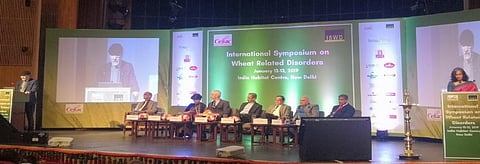

Wheat, the staple food for crores of Indians, is also responsible for celiac disease—an autoimmune disorder—among lakhs of them. The numbers are rising but most Indians are unaware, experts said at a recent meet.
The prevalence of celiac disease has jumped four folds in India since 1960s and now eighty lakh people are affected, according to experts at the International Symposium on Wheat Related Disorders (ISWD).
The conference, hosted by Celiac Society of India (CSI) on January 12, 2019, discussed celiac and other wheat-related disorders.
Celiac, which the experts say 90 per cent Indians are unaware of, has affected those with a specific gene type called DQA1 or B1. This gene in turn expresses the genes DQ2 or DQ8, which is prone to celiac disease.
A 2015 study, however, revealed that only the presence of DQ2 or DQ8 is not enough for acquiring the disease, and other gene types can also inhibit the disease, B S Ramakrishna, head of gastroenterology at Chennai-based SRM Institutes for Medical Science, said.
“Out of 20,000 adults tested, 30 per cent did not have DQ2 or DQ8 in their genes,” Ramakrishna, who presented an alternative scenario, added. The study found 1.2 per cent of the population in Haryana, 0.085 per cent in Assam and one in a thousand people in south India had celiac.
Celiac is just one of the many disorders related to wheat, and gluten is just one of the many triggers, said Thomas O’ Bryan DC, faculty at the institute for functional medicine and the national university of health sciences, Florida.
The current prevalence of disorders related to wheat could be attributed to the hybrid varieties of wheat which have increased levels of gluten, he added.
The experts also pointed out other toxins, including preservatives and chemicals present in food that could trigger wheat related disorders.
Does this mean that we should cut out roti or any form of wheat from out diet? Experts say that this is not needed unless one has tested positive for celiac disease.
They suggest a gluten free diet only for those who have tested positive. Further, they suggested that doctors begin testing patients for celiac disease when presented with unusual symptoms.
During the conference, experts gave the example of a girl who had an eye tumour and was taken to an ophthalmologist. The doctor first suspected that she had HIV but her results were negative. When the doctor asked for a biopsy, he was informed that the girl had recently undergone a laparoscopy test for celiac disease, due to which she was put on a gluten free diet.
A week after adopting the diet, the tumour began to recede and a month later it disappeared. This helped the doctor narrow down on the symptoms.